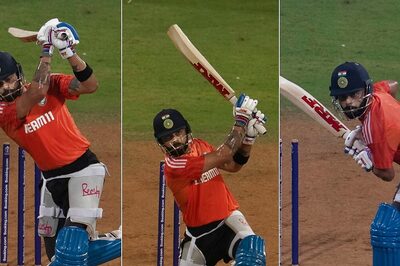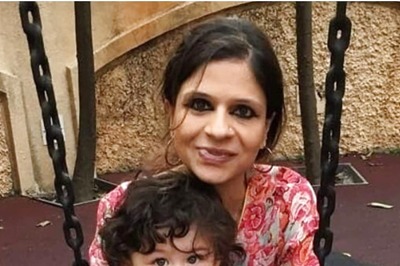
views
Aiming in Video Games

Track your target with the reticle while you move in the game. When you’re moving in game, move the reticle, which is your crosshairs, so that you’re always looking at the thing you’re aiming at regardless of the direction you’re moving. Even if there isn’t an opponent or enemy in front of you, keep the reticle aimed at corners and doorways where the enemy may appear. If an enemy is in front of you, keep the reticle on them even if you aren’t firing yet. Different games have different projectile speeds. Depending on the game, you may want to aim a little in front of your opponent if they’re moving laterally. If you’re using a weapon with a scope function, don’t turn it on until right before you plan on shooting. If you keep the scope on, you’re obscuring your field of vision for no benefit.

Use flick-shots to develop accurate reflexes and fire at moving targets. Flick-shooting is a common technique for snipers and players with non-automatic weapons. It involves holding the reticle in a neutral position on the horizon and moving quickly to your target once they appear in your field of vision. After you let a shot off, immediately move the cursor back to the same neutral position. This will train your vision and reflexes to let off accurate shots quickly when you’ll only get one or two shots. This is a good general strategy if you’re camping. Keep your neutral position on the spawn point, doorway, or corner you’re covering and move it quickly as targets enter the area. It’s hard to get used to this. Expect this to be kind of difficult to do for your first couple of matches. If you’re using an automatic weapon, shotgun, or you’re playing a more aggressive style, this is likely not the best way to aim. This is the best way to aim skillshots in MOBAs and RPGs as well.

Crouch when firing to control your reticle and keep it from moving. In most modern games, kickback is greatly reduced when you shoot from a crouched position. If this is true in your game, always hit the crouch button right before you plan to let off a few shots. If you aren’t sure whether crouching improves your accuracy or not, watch the size of the reticle when you crouch. If the reticle gets smaller when you’re crouching, it’s helping with the accuracy. Crouching may be a good idea even if it doesn’t reduce kickback. In a 1-on-1 fight, crouching makes you harder to hit.

Use single or burst shots instead of holding down the trigger. In most games, the longer you hold the trigger down, the wider your field of fire becomes. This dramatically lowers your accuracy. To avoid this, pull the trigger once every 1-2 seconds or let off a series of fast, individual shots instead of holding the trigger down. This will dramatically improve your accuracy. In some games, there is a setting where you can change the shooting mode for certain guns.

Practice your aim with aim trainers or reflex games. Aim trainers are simple online games that help you practice your reflexes and aiming. There are hundreds of aim trainers online, so just pick one for the game that you play. Alternatively, you can play reflex games like OSU, Beat Aim, or Audiosurf to improve your aiming skills. Playing an aim trainer or reflex game for 15-20 minutes a day is a great way to improve over time.

Lower the sensitivity if you’re using a game controller. If you’re playing a game on a console, go into the game’s settings. Lower the in-game x- and y-axis sensitivity so that your joysticks are slower than they normally are. This will make it easier to control your movement and aiming in your game. Many players assume that a higher sensitivity is better for aiming. It’s not. When the sensitivity is high, any minor mistake can throw your aim off. If it’s lower, you give yourself a wider margin of error. It’s also a lot harder to get disoriented when your motions are slower. As a console player, you can still benefit from the in-game aiming techniques here, but don’t worry about the mouse settings, DPI, or technical tips. If you’re interested in competitive gaming or really improving your aim, switch to a mouse and keyboard. Controllers are much harder to use accurately than a mouse and keyboard.

Buy a lightweight, wired mouse with a high DPI for PC gaming. The lighter your mouse is, the easier it will be to move. Stay away from wireless mice since they tend to have a minor delay. When considering a mouse, purchase a mouse with a DPI of 1,000 or higher. DPI stands for dots per inch, and it refers to how many pixels a cursor covers when you move the mouse. A high DPI isn’t always better for aiming, but a high DPI combined with a low in-game sensitivity is a recipe for success. Some mice have variable DPIs that you can change by pressing a button on the mouse. These are a great option if you want more control over the settings. The cheap throwaway mice you can buy for $5-10 at an office supply store often have a DPI between 400-600. A high-end gaming mouse on the other hand may have up to 16,000 DPI. Most people don’t need a DPI this high, so as long as it’s higher than 1,000, you should be fine. Mousepads are all more-or-less the same in terms of function, but the size is pretty important. Get the biggest mousepad that will fit on your desk to give yourself plenty of room to move.

Change your in-game sensitivity based on your mouse’s DPI. When you open a game, go into the settings panel and lower the aim sensitivity. The higher your DPI is, the lower you’ll want to set the sensitivity. While this is largely a matter of personal preference, toy around with the sensitivity settings until your cursor moves a little slower than you’d normally set it. In most games, with 1600 DPI, you’ll want the sensitivity set to 10-30%. So long as you can turn 180 degrees when moving the mousepad from one edge of the mousepad to another, you’re fine.
Aiming in Ball Sports

Use your glove and shoulders to square up throws in baseball. Turn your feet to line up with your target. As you take the ball out of your glove, point the glove towards your target. Focus your eyes on where you want to throw the ball. As you turn your torso to throw the ball, pull the glove up to your chest and stop rotating your shoulders as they line up with the target. You can use your elbow instead of your glove if you prefer. Pitchers usually use the elbow instead of the glove. Follow through by flicking your wrist towards your target and letting the ball roll off of your fingertips.

Balance yourself and keep your elbows tight to hit shots in basketball. Line your feet up underneath your shoulders so that your toes are facing the rim. Bend your knees and use your lower body strength to jump as you raise the ball up in front of you. Keep both elbows in and line your shooting elbow up vertically with the rim. Release the ball above your head when you’re at the apex of your jump. Snap your shooting wrist forward as you’re releasing the ball to put the backspin on it. In basketball, you basically want to use the same mechanics for every single shot that isn’t a layup. You change how hard you’re shooting to control the distance the ball travels.

Hold the laces with two fingers and snap your wrist to throw a football. Grip the laces so that your pinky and ring finger are on the back half of the laces. Brace the ball on the other side with your thumb and put your index up around the back portion of the ball. Line your feet up with the target and raise your front elbow to aim. As you throw the football, snap your wrist towards your target to release a spiral where you’re aiming. The cleaner the spiral is, the more accurate your throw should be. If the ball is wobbling through the air, it won’t travel in a clean arc towards your target.

Plant your off-foot and raise the opposite arm to kick a soccer ball. Take a large step with your nondominant foot and plant it next to the ball. While doing this, raise your dominant arm to balance yourself. Look at your target quickly before looking back at the ball. Drive through the ball with your dominant foot and swing it through towards your target. The part of the foot you use determines the speed and accuracy. Kick the ball with the side of your foot to keep your kicks accurate. If you want more power, use the front of your foot.
Hitting Targets with Weapons

Grip a gun with both hands and aim with your dominant eye to shoot. For a handgun, put both hands on the handle and point your index finger down the barrel. On a rifle or shotgun, place your nondominant hand on the secondary grip or under the barrel. Hold the gun up and use the sight at the end of the gun to line the barrel up with your target. Gently press the trigger instead of pulling it hard to maintain your aim as you fire off a round. Assume that the gun is always loaded and never point it at anyone. Keep your finger off of the trigger and the trigger guard until you’re about to shoot. If you can, fire the shot while you’re exhaling or during a break in your breathing pattern to avoid accidentally moving the sight off of your target.

Stabilize your bow and hold the fletch under your chin to fire an arrow. Line your feet up with the target and point your toes away from you at a 90-degree angle to the target. Bend your knees very slightly, draw your arrow, and nock it back against the string with your finger sling. Aim with your dominant eye and draw the arrow back so the arrow rests under your chin. Line the shot up with the sightline on the bow and hold the position as you release the arrow. Line the arrow up so that one fletch points directly towards. This will ensure that the arrow travels flat out of the bow. You don’t need to hold the bow tight as you’re aiming. In fact, your body should be relaxed as you aim to keep the arrow lined up with your target. Draw the arrow straight back. If you pull it back at an angle, you may not fire a clean arrow. If you need to increase the distance, raise the angle of the bow, not the arrow.

Throw a knife by tossing it downward like you’re throwing a ball. Get a knife designed for knife throwing. Hold the handle by tucking it in between your thumb and index finger. Lift the knife up slowly behind your ear and focus on the spot you want to throw the knife. Hurl it forward and release the handle by letting it slide out of your hand without flicking your wrist. You must use a knife designed for knife throwing for this. These knives have heavier blades than normal knives. Since you have to throw a knife by gripping it by the lightest portion, you’d need to hold the blade if you use a regular knife. It is not safe to do this! If you flick your wrist as you throw, you’ll decrease the odds that the blade stays stable enough to hit the target cleanly. Axe-throwing is done almost identically to knife-throwing. The only difference is that you can use two hands to grip the handle. You still throw it overhand like a baseball and your goal is to not flick your wrist as you release it.




















Comments
0 comment